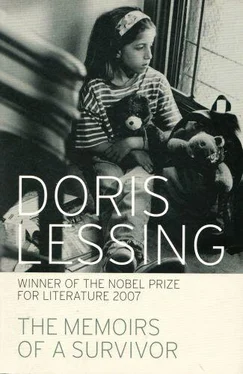These were the children Gerald had decided must be rescued by his household. Where would they all fit in? Well, somewhere, and if they didn't, there was that other big house just across the road, and perhaps Emily and he could run the two houses between them?
There was much resistance to the idea. From everybody. Emily too. But Gerald wore them down: he always did, because after all it was he who maintained them, got food and supplies — he who took responsibility. If he said it could be done, then perhaps… and they were just 'little kids', he was right about that. 'Just little kids, how can we let them rot out there?'
I believe that the others in the house comforted themselves with 'they won't come anyway'. They were wrong. Gerald could make people believe in him. He went down the Underground, heavily armed and showing it. Yes, he was terrified… they crept from holes and corners and tunnels, they seemed able to see without much light whereas he was half-blinded by the flare of the torch. He was alone down there, and he was an enemy, since everybody was, offering them something they did not even know the words for. But he was able to make them follow him. He walked back from the Underground like a Pied Piper, and the twenty or so children who followed him ran and shouted all over the house, flinging open doors and slamming them, putting their fists through the precious polythene in the windows. Smelling food being cooked, they stood crowded together waiting for it to come their way. They saw people sitting down, children their own ages with the adults, a sight that was astonishing to them. They were subdued, it seemed; or at least their reflexes were temporarily put out. Or perhaps they were curious? They would not sit down at table — they never had, they would not sit down on the floor in an orderly way to be served, but they did stand snatching at food which was passed to them on trays, and bolted it down, their bright hard eyes watching everything, trying to understand. When there was not enough food to fill their aroused expectations, they ran shrieking and jeering through the house, destroying everything.
At once that household broke up. Gerald would not listen to reason, to the appeals of the existing inhabitants. There was something about the situation of those children which Gerald could not tolerate; he had to have them in there, he had to try, and now he would not throw them out. By then it was too late. The others left. It took a few hours for Gerald and Emily to find their 'family' all gone, while they were house-parents of children who were savages. Gerald had apparently actually believed that they could be taught rules which had been made for everyone's sake. Rules? They could hardly understand what was said: they had no idea of a house as a machine. They wrecked everything, tore up the vegetables in the garden, sat at windows throwing filth at passers-by like monkeys. They were drunk; they had taught themselves drunkenness.
From my window I saw that Emily had her arm in bandages, and went over to ask what was wrong.
'Oh, nothing much,' said she, with her dry little humour, and then told how she and Gerald, descending that morning to the lower regions of the house, had found the children squatting and scratching all together, like monkeys in a too-small cage. There were bits of half-cooked meat about. They had been roasting rats: near the house was an entrance to some sewers. Nothing under the earth could be alien to these children, and they had crept down there with their catapults and bows and arrows.
Upstairs, Emily and Gerald had had a talk about tactics. Their situation was bleak. They had not been able to find any of their own children — not one. These had all left for other communes or households, or had decided that this was the moment to join a caravan going out of the city for good. The two were completely alone with these new children. They at last decided that a sharp business-like descent into the lower part of the house, and a reasonable but stern talk, must be attempted. What they envisaged was, in fact, the immemorial 'sensible' talk of adults appealing to children's better sense before retribution had to fall. The trouble was, no retribution was possible, everything had already happened to these outcasts. Emily and Gerald realised they had nothing to threaten them with, and nothing to offer but the old arguments that life is more comfortable for a community if the members keep the place clean, share work, respect each other's individuality. And the children had survived without such thoughts ever having come near them.
But, not being able to think of anything else, the two young parents did go down, and one of the brats had suddenly run at Emily and hit her with a cudgel. Had hit her again and shouted — in a moment another little child had jumped in to attack. Gerald, going to rescue Emily, had found himself, too, being hit, bitten, scratched, and by a dozen or so of them. It had taken all their strength to fight off these children, not one of whom was over ten, and yet the inhibition against hitting or hurting a child was so strong that it 'paralysed our arms', as Emily explained. 'How can you hit a child?' Gerald had demanded, even though Emily's arm was badly bruised. Standing there, embattled, blood all over the place, the two young people had fended off children, and, screaming above their screams, had tried to reason and persuade. The response to these exhortations was that the children had got themselves into a tight knot in a corner of the room, facing out, teeth bared, holding their cudgels ready to repel an attack, as if the words had been missiles. At last Emily and Gerald removed themselves, had another discussion, decided more must be attempted, but did not know what. That night, lying in their bed at the top of the house, they smelled smoke: the children had set fire to the ground floor, just as if the house were not their shelter. The fire was put out, and again the little savages cowered behind their weapons while Gerald, beside himself with emotion — for he simply could not endure that these children were not to be saved (for what, of course, was a question not one of us would ask) — Gerald pleaded and reasoned and persuaded. A stone from a catapult just missed his eye, and cut open his cheekbone.
What was to be done?
The children could not be thrown out. Who was to throw them out? No, with his own hands, Gerald had opened the gates to the invaders, who would now stay. Why not! They had piles of bedding, clothing, a fireplace to burn fuel in — they had never been warm before. Yes, almost certainly the house would soon burn down. It had been tidy and clean; now there was food everywhere, on floor, walls, ceilings. It stank of shit: the children used landings, even the rooms they slept in. They did not even have the cleanliness of animals, their instincts for responsibility. In every way they were worse than animals, and worse than men.
They menaced everyone in the neighbourhood, and there was to be a big meeting about it tomorrow on the pavement. People were coming from the flats and from the houses round about. I was invited. That the barriers were completely down between the citizens and the life on the pavement showed how serious a threat were these children.
Next afternoon I went out, careful to leave Hugo in my bedroom, the door locked, the curtains drawn.
It was an autumn afternoon, the sun low and cold. Leaves were flying everywhere. We stood in a great mass, five hundred or more, and people kept coming in to join us. On a little improvised platform of bricks were the half a dozen leaders. Emily was up there with Gerald.
Before the talking began, the children who were to be discussed arrived and stood a little apart, listening. There were now about forty of them. I remember that we were all encouraged they were with us, had come at all — community feeling of a kind, perhaps? At least they had understood there was to be a meeting that concerned them; they had taken in words, and understood them in the same way we did… then they began stamping around and chanting: I am the king of the castle, you are a dirty rascal. It was terrifying. This ancient children's song was a war-song, they had made it one, they were living it. But more than that, we could all see how familiar words could slip out of key — how quickly things could change, we could change… Had changed: those children were ourselves. We knew it. We stood there, sullen and uncomfortable, listening. It was in accompaniment to this shrill jeering chant that Gerald began to describe the situation. Meanwhile there was apprehension, a restlessness in the crowd, which was due to more than the presence of the children, or our knowledge of ourselves. For this was like a 'mass meeting' of the ordinary world, and we had every reason to fear such meetings. Above all what we feared more than anything was the attention of Authority — that 'they' should be alerted. Gerald, reasonable as he always was, explained how essential it was, for the sake of us all to rescue the child, and we, standing shoulder to shoulder, again listening to a person talking down at us from a platform, were thinking that this was one street in one of many suburbs, that our comfortable habit of seeing only ourselves, our pavements and their energetic life, was a way of being able to cope with the fear. A useful way: we were not important, and the city was large. We were able to continue our precarious little lives because of our good sense, which enabled Them to take no notice of us. What they chose to overlook was all the time more; but they still would not stand for the burning down of a house or a street, or for a gang of children who were under no one's control terrorising everyone. They had their spies among us. They knew what went on.
Читать дальше
Конец ознакомительного отрывка
Купить книгу












